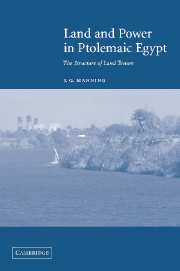Book contents
- Frontmatter
- Contents
- List of maps, figures and tables
- Preface
- Abbreviations
- Units of measure
- Maps
- Part I ISSUES AND HISTORICAL BACKGROUND
- Chapter 1 Issues and methodologies
- Chapter 2 The Ptolemaic state and its antecedents
- Part II REGIONAL CASE STUDIES OF LAND TENURE
- Part III INTERPRETATION
- Appendix 1 Translation of the Edfu donation text
- Appendix 2 Ptolemaic demotic land transfers from Upper Egypt
- Appendix 3 Translation of P. Amh. gr. 49
- List of references
- Index of sources
- General index
Chapter 1 - Issues and methodologies
Published online by Cambridge University Press: 22 September 2009
- Frontmatter
- Contents
- List of maps, figures and tables
- Preface
- Abbreviations
- Units of measure
- Maps
- Part I ISSUES AND HISTORICAL BACKGROUND
- Chapter 1 Issues and methodologies
- Chapter 2 The Ptolemaic state and its antecedents
- Part II REGIONAL CASE STUDIES OF LAND TENURE
- Part III INTERPRETATION
- Appendix 1 Translation of the Edfu donation text
- Appendix 2 Ptolemaic demotic land transfers from Upper Egypt
- Appendix 3 Translation of P. Amh. gr. 49
- List of references
- Index of sources
- General index
Summary
Countless lands and tribes of mankind without number raise crops that ripen under Zeus' beneficent rain, but no land is as fertile as the lowland of Egypt, where the Nile, overflowing, soaks and breaks up the clods. Nor is there a country with so many cities of men skilled in labor; three hundred cities have been established within it, three thousand and three times nine more, and Ptolemy rules as king over them all.
Theocritus, Idyll 17In the Near East and Egypt, irrigation gave the entire economy of these areas a very specific character in historical times.
Weber 1998 [1909]: 38PTOLEMAIC EGYPT
This book is about land tenure and the structure of the Ptolemaic state (332 bce–30 bce). The taxation from agricultural production was an important element of Ptolemaic wealth – a common theme in Hellenistic literature – and the assignment and use of land was the primary method of establishing rents (i.e. income) for the bureaucratic, temple, and military hierarchy. The relationship of the ruler to the elite constituencies and to the local population is one of the key subjects in Hellenistic history, for which Ptolemaic Egypt provides important evidence. A study of the organization of land tenure, therefore, raises questions about the nature of social power in the state, and the economic structure of the land tenure regime. Most models of the Ptolemaic state have assumed that it was a highly centralized, rational bureaucratic state imposed on a passive rural peasantry.
- Type
- Chapter
- Information
- Land and Power in Ptolemaic EgyptThe Structure of Land Tenure, pp. 3 - 26Publisher: Cambridge University PressPrint publication year: 2003



